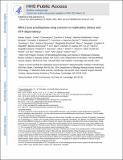BRG1 Loss Predisposes Lung Cancers to Replicative Stress and ATR Dependency
Author(s)
Gupta, Manav; Concepcion, Carla P.; Fahey, Caroline G.; Keshishian, Hasmik; Bhutkar, Arjun; Brainson, Christine F.; Sanchez-Rivera, Francisco J.; Pessina, Patrizia; Kim, Jonathan Y.; Simoneau, Antoine; Paschini, Margherita; Beytagh, Mary C.; Stanclift, Caroline R.; Schenone, Monica; Mani, D.R.; Li, Chendi; Oh, Audris; Li, Fei; Hu, Hai; Karatza, Angeliki; Bronson, Roderick T.; Shaw, Alice T.; Hata, Aaron N.; Wong, Kwok-Kin; Zou, Lee; Carr, Steven A.; Jacks, Tyler; Kim, Carla F.; ... Show more Show less
DownloadAccepted version (2.509Mb)
Open Access Policy
Open Access Policy
Creative Commons Attribution-Noncommercial-Share Alike
Terms of use
Metadata
Show full item recordAbstract
Inactivation of SMARCA4/BRG1, the core ATPase subunit of mammalian SWI/SNF complexes, occurs at very high frequencies in non-small cell lung cancers (NSCLC). There are no targeted therapies for this subset of lung cancers, nor is it known how mutations in BRG1 contribute to lung cancer progression. Using a combination of gain- and loss-of-function approaches, we demonstrate that deletion of BRG1 in lung cancer leads to activation of replication stress responses. Single-molecule assessment of replication fork dynamics in BRG1-deficient cells revealed increased origin firing mediated by the prelicensing protein, CDC6. Quantitative mass spectrometry and coimmunoprecipitation assays showed that BRG1-containing SWI/SNF complexes interact with RPA complexes. Finally, BRG1-deficient lung cancers were sensitive to pharmacologic inhibition of ATR. These findings provide novel mechanistic insight into BRG1-mutant lung cancers and suggest that their dependency on ATR can be leveraged therapeutically and potentially expanded to BRG1-mutant cancers in other tissues.
Date issued
2020-07Department
Koch Institute for Integrative Cancer Research at MIT; Massachusetts Institute of Technology. Department of Biology; Howard Hughes Medical InstituteJournal
Cancer Research
Publisher
American Association for Cancer Research (AACR)
ISSN
0008-5472
1538-7445